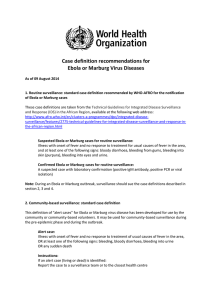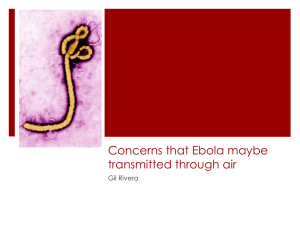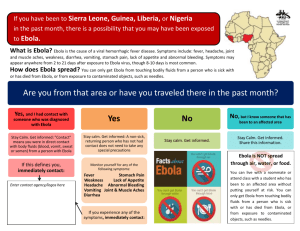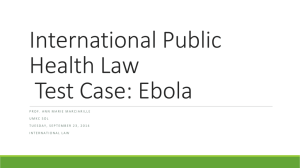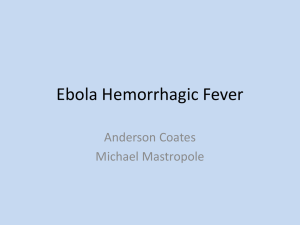Case definition for Ebola or Marburg Virus Diseases
advertisement
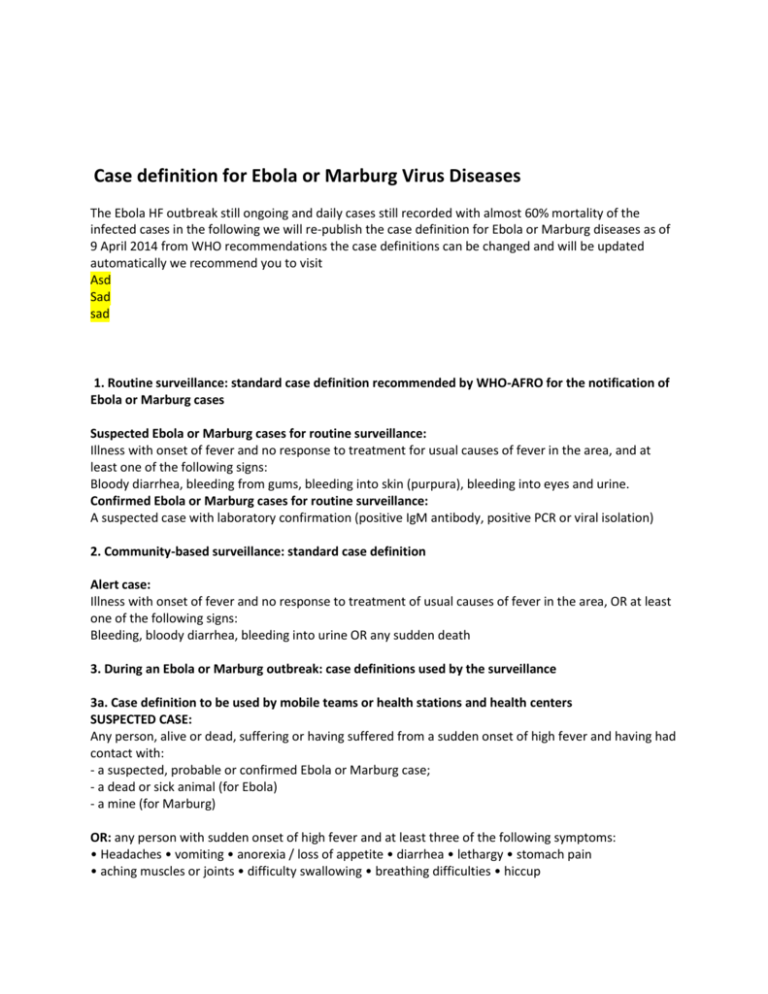
Case definition for Ebola or Marburg Virus Diseases The Ebola HF outbreak still ongoing and daily cases still recorded with almost 60% mortality of the infected cases in the following we will re-publish the case definition for Ebola or Marburg diseases as of 9 April 2014 from WHO recommendations the case definitions can be changed and will be updated automatically we recommend you to visit Asd Sad sad 1. Routine surveillance: standard case definition recommended by WHO-AFRO for the notification of Ebola or Marburg cases Suspected Ebola or Marburg cases for routine surveillance: Illness with onset of fever and no response to treatment for usual causes of fever in the area, and at least one of the following signs: Bloody diarrhea, bleeding from gums, bleeding into skin (purpura), bleeding into eyes and urine. Confirmed Ebola or Marburg cases for routine surveillance: A suspected case with laboratory confirmation (positive IgM antibody, positive PCR or viral isolation) 2. Community-based surveillance: standard case definition Alert case: Illness with onset of fever and no response to treatment of usual causes of fever in the area, OR at least one of the following signs: Bleeding, bloody diarrhea, bleeding into urine OR any sudden death 3. During an Ebola or Marburg outbreak: case definitions used by the surveillance 3a. Case definition to be used by mobile teams or health stations and health centers SUSPECTED CASE: Any person, alive or dead, suffering or having suffered from a sudden onset of high fever and having had contact with: - a suspected, probable or confirmed Ebola or Marburg case; - a dead or sick animal (for Ebola) - a mine (for Marburg) OR: any person with sudden onset of high fever and at least three of the following symptoms: • Headaches • vomiting • anorexia / loss of appetite • diarrhea • lethargy • stomach pain • aching muscles or joints • difficulty swallowing • breathing difficulties • hiccup OR: any person with inexplicable bleeding OR: any sudden, inexplicable death. 3b. Case definition for exclusive use by hospitals and surveillance teams PROBABLE CASE: Any suspected case evaluated by a clinician OR: Any deceased suspected case (where it has not been possible to collect specimens for laboratory confirmation) having an epidemiological link with a confirmed case LABORATORY CONFIRMED CASE: Any suspected or probably cases with a positive laboratory result. Laboratory confirmed cases must test positive for the virus antigen, either by detection of virus RNA by reverse transcriptase-polymerase chain reaction (RT- PCR), or by detection of IgM antibodies directed against Marburg or Ebola. NON-CASE: Any suspected or probable case with a negative laboratory result. “Non-case” showed no specific antibodies, RNA or specific detectable antigens. 4. Standard definition for contacts persons of Ebola or Marburg cases Ebola or Marburg case contacts: Any person having had contact with an Ebola or Marburg in the 21 days preceding the onset of symptoms in at least one of the following ways: during the illness Contacts of dead or sick animals: Any person having had contact with a sick or dead animal in the 21 days preceding the onset of symptoms in at least one of the following ways: s blood or body fluids -meat Laboratory contacts: Any person having worked in a laboratory in the 21 days preceding the onset of symptoms in at least one of the following ways: ith specimens collected from suspected Ebola or Marburg patients Other infection risk factors include: contact with a hospital where Ebola or Marburg cases are being treated, infection or vaccination in the 21 days preceding the onset of symptoms.


